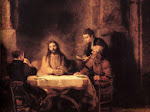 rse has any objective meaning or purpose, but then moves on to create a subjective meaning and purpose, usually out of a life changing experience where one awakens from a dreamlike state - sometimes called a self-actualized life. The life-changing experience can come in many ways, including mysticism, philosophy, drugs, even a religious experience, it doesn't matter, as long as it changes your life and gives you meaning and purpose.
rse has any objective meaning or purpose, but then moves on to create a subjective meaning and purpose, usually out of a life changing experience where one awakens from a dreamlike state - sometimes called a self-actualized life. The life-changing experience can come in many ways, including mysticism, philosophy, drugs, even a religious experience, it doesn't matter, as long as it changes your life and gives you meaning and purpose.
A Christian doesn't face this problem. For a Christian who believes in the Bible, God gives meaning and purpose to life as well as in their life - and to the universe for that matter. That hardly means Christians do not have problems,  but meaning and purpose is not one of them. Now a Christian may wonder what God wants them to do with their life, which is an entirely healthy question and endeavor. However, that is far different from giving up all hope that there is any meaning or purpose in the universe or in our lives.
but meaning and purpose is not one of them. Now a Christian may wonder what God wants them to do with their life, which is an entirely healthy question and endeavor. However, that is far different from giving up all hope that there is any meaning or purpose in the universe or in our lives.
Moreover, for the Christian, this is an objective meaning and purpose, not subjective, nor simply an existentialist religious experience. A Christian can have good and sufficient reason for his belief in God and faith. In other words, this faith is reasonable - not unreasonable. Perhaps I will explain the reasonable grounds for faith in another blog, but Christians throughout history and to the present assert their faith is reasonable, and reject an unreasonable grounds for faith, even to the present.
Therefore, Christians have a good answer to the modern despair in meaning and purpose - found throughout philosophy, art, theater, and literature. Further, Christians do not have to seek a subjective meaning and purpose to make this despair bearable.







